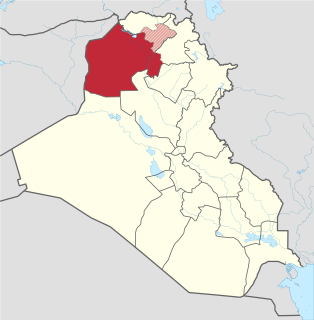The politics of Iraq take place in a framework of a federal parliamentary representative democratic republic. It is a multi-party system whereby the executive power is exercised by the Prime Minister of the Council of Ministers as the head of government, as well as the President of Iraq, and legislative power is vested in the Council of Representatives and the Federation Council.

Nineveh Governorate is a governorate in northern Iraq that contains the ancient Assyrian city of Nineveh. It was an integral part of Assyria from the 25th century BC to the 7th century AD. It has an area of 37,323 km2 (14,410 sq mi) and an estimated population of 2,453,000 people in 2003. Its chief city and provincial capital is Mosul, which lies across the Tigris river from the ruins of ancient Nineveh. Tal Afar is the second-biggest city. Before 1976, it was called Mosul Province and included the present-day Dohuk Governorate, which is now part of the autonomous Iraqi Kurdistan.

Elections for the National Assembly of Iraq were held on January 30, 2005 in Iraq. The 275-member National Assembly was a parliament created under the Transitional Law during the Occupation of Iraq. The newly elected transitional Assembly was given a mandate to write the new and permanent Constitution of Iraq and exercised legislative functions until the new Constitution came into effect, and resulted in the formation of the Iraqi Transitional Government.
Elections in Iraq gives information on election and election results in Iraq.

The electorate of Iraq went to the polls on 15 October 2005 to vote in a referendum on whether or not to ratify the proposed constitution of Iraq. After 10 days of counting votes, the country's electoral commission announced that the constitution had been approved by a wide margin nationwide. A number of critics allege massive irregularities, especially in the crucial province of Ninawa, which was widely expected to provide the third "no" vote.

Following the ratification of the Constitution of Iraq on 15 October 2005, a general election was held on 15 December to elect a permanent 275-member Iraqi Council of Representatives.

The Mujahideen Shura Council (MSC),, was an umbrella organization of at least six Sunni Islamic insurgent groups taking part in the Iraqi insurgency against U.S. and coalition and Iraqi forces: Tanzim Qaidat al-Jihad fi Bilad al-Rafidayn, Jaish al-Ta'ifa al-Mansurah, Katbiyan Ansar Al-Tawhid wal Sunnah, Saray al-Jihad Group, al-Ghuraba Brigades, and al-Ahwal Brigades.

The Battle of Al Qaim was a military offensive conducted by the United States Marine Corps, against insurgent positions in Iraq's northwestern Anbar province, which ran from 8 May 2005 to 19 May 2005. It was focused on eliminating insurgents and foreign fighters in a region known as a smuggling route and a sanctuary for foreign fighters.

Sheik Ahmed Bezaa Abu Risha is a Sunni leader in the Al-Anbar province, and led the movement of Sunni tribesmen known as the Anbar Salvation Council.

Governorate or provincial elections were held in Iraq on 31 January 2009, to replace the local councils in fourteen of the eighteen governorates of Iraq that were elected in the Iraqi governorate elections of 2005. 14,431 candidates - including 3,912 women - contested 440 seats. The candidates came from over 400 parties - 75% of which were newly formed.

A parliamentary election was held in Iraq on 7 March 2010. The election decided the 325 members of the Council of Representatives of Iraq who would elect the Iraqi prime minister and president. The election resulted in a partial victory for the Iraqi National Movement, led by former Interim Prime Minister Ayad Allawi, which won a total of 91 seats, making it the largest alliance in the Council. The State of Law Coalition, led by incumbent Prime Minister Nouri Al-Maliki, was the second largest grouping with 89 seats.
The Al Anbar Governorate election of 2009 was held on 31 January 2009 alongside elections for all other governorates outside Iraqi Kurdistan and Kirkuk.

Assyrian politics in Iraq have been taking many different turns since the US invasion of Iraq in 2003. Today, there are many different Assyrian political parties in Iraq. The main Assyrian party that came out from the 2005 elections was the Assyrian Democratic Movement. However, Sarkis Aghajan began to challenge its power beginning in 2006 with the opening of Ishtar TV and the KDP-affiliated Chaldean Syriac Assyrian Popular Council.

Governorate or provincial elections were held in Iraq on 20 April 2013, to replace the local councils in the governorates of Iraq that were elected in the Iraqi governorate elections of 2009. Elections took place in 12 of Iraq's 18 governorates. Elections didn't take place in the 3 governorates forming the Kurdistan Region or Kirkuk, Anbar, or Ninevah, meaning that a total of 378 provincial council seats were up for election.

Operation al-Shabah was launched in May 2013 by the Iraqi Army, with the stated aim of severing contact between the Islamic State of Iraq and the Levant and the al-Nusra Front in Syria by clearing militants from the border area with Syria and Jordan.
The Muthanna governorate election of 2013 was held on 20 April 2013 alongside elections for all other governorates outside Iraqi Kurdistan, Kirkuk, Anbar, and Ninevah.
The Al Anbar governorate election of 2013 was held on 20 June 2013 alongside elections for Ninevah.

The 2013 Nineveh Governorate election in Iraq was held on 20 June with elections for the Al Anbar Governorate. Due to security problems, turnout was less than half that of the 2009 election. This election saw Sunni Arab parties lose a number of seats to minority parties.
Ahmad Khalaf al-Dulaimi is an Iraqi politician and was the Governor of Al Anbar province from August 2013 to December 2014.














